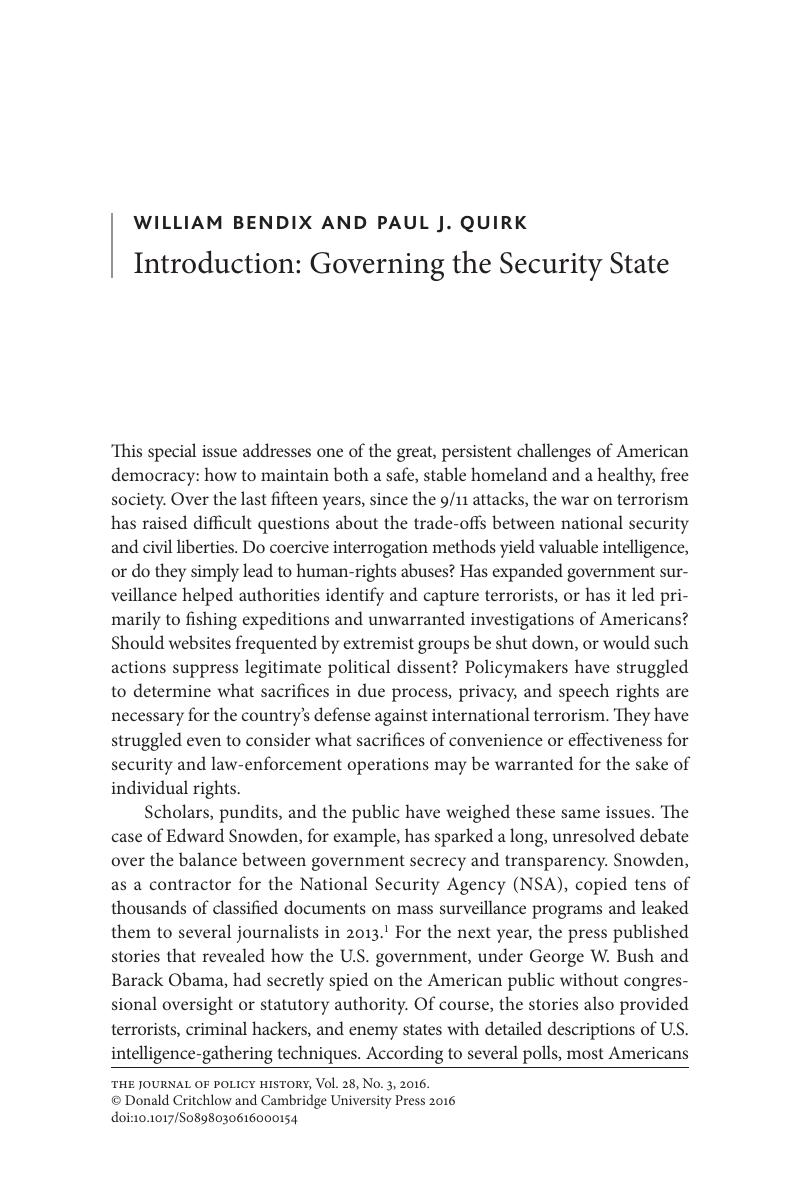Article contents
Introduction: Governing the Security State
Published online by Cambridge University Press: 13 June 2016
Abstract

- Type
- Articles
- Information
- Journal of Policy History , Volume 28 , Special Issue 3: Governing the Security State , July 2016 , pp. 399 - 405
- Copyright
- Copyright © Donald Critchlow and Cambridge University Press 2016
References
NOTES
1. Greenwald, Glenn, No Place to Hide: Edward Snowden, the NSA, and the U.S. Surveillance State (New York, 2014), 90.Google Scholar
2. For example, in a poll conducted one year after the first NSA leaks, about 25 percent of respondents said they supported Snowden, about 35 percent said they opposed him, and the remaining 40 percent said they were unsure. See Mark Murray, “More Americans Oppose Edward Snowden’s Actions than Support Them,” NBC News, 1 June 2014, http://www.nbcnews.com/news/us-news/more-americans-oppose-edward-snowdens-actions-support-them-n119476.
3. Senator Rand Paul (R-Ky.) suggested that as president he would consider pardoning Snowden, while Senator Bernie Sanders (I-Vt.) said that he favored light penalties for the NSA leaker. See Jessica Hopper, “Would Rand Paul Pardon Edward Snowden?” ABC News, 10 October 2015, http://abcnews.go.com/Politics/rand-paul-pardon-edward-snowden/story?id=34379901; Sam Thielman, “Hillary Clinton and Bernie Sanders Call for Edward Snowden to Face Trial,” The Guardian, 13 October 2015, http://www.theguardian.com/us-news/2015/oct/13/clinton-sanders-snowden-nsa-democratic-debate.
4. Posner, Eric and Vermeule, Adrian, Terror in the Balance: Security, Liberty, and the Courts (New York, 2007), 3.Google Scholar
5. Mundis, Daryl A., “The Use of Military Commissions to Prosecute Individuals Accused of Terrorist Acts,” American Journal of International Law 96 (2002): 320–28;CrossRefGoogle Scholar John Yoo, War by Other Means: An Insider’s Account of the War on Terror (New York, 2006).
6. Davis, James Kirkpatrick, Spying on America: The FBI’s Domestic Counterintelligence Program (New York, 1992).Google Scholar
7. Nate Silver, “Domestic Surveillance Could Create a Divide in the 2016 Primaries,” FiveThirtyEight/The New York Times, 13 June 2013, http://fivethirtyeight.blogs.nytimes.com/2013/06/11/domestic-surveillance-could-create-a-divide-in-the-2016-primaries/?_r=0.
8. Bendix, William and Quirk, Paul J., “Secrecy and Negligence: How Congress Lost Control of Domestic Surveillance,” Issues in Governance Studies 68, Brookings Institution (March 2015): 14–15.Google Scholar
9. Ignatieff, Michael, The Lesser Evil: Political Ethics in an Age of Terror (Princeton, 2005), chap. 1.Google Scholar
10. Colaresi, Michael P., Democracy Declassified: The Secrecy Dilemma in National Security (New York, 2014).Google Scholar
11. For example, see Albertson, Bethany and Gadarian, Shana Kushner, Anxious Politics: Democratic Citizenship in a Threatening World (New York, 2015)Google Scholar; Brooks, Clem and Manza, Jeff, Whose Rights? Counterterrorism and the Dark Side of American Public Opinion (New York, 2013)Google Scholar; Davis, Darren W. and Silver, Brian D., “Civil Liberties vs. Security: Public Opinion in the Context of the Terrorist Attacks on America,” American Journal of Political Science 48, no. 1 (2004): 28–46;CrossRefGoogle Scholar Huddy, Leonie, Feldman, Stanley, Taber, Charles, and Lahav, Gallya, “Threat, Anxiety, and Support of Antiterrorism Policies,” American Journal of Political Science 49, no. 3 (2005): 593–608.CrossRefGoogle Scholar
- 1
- Cited by




